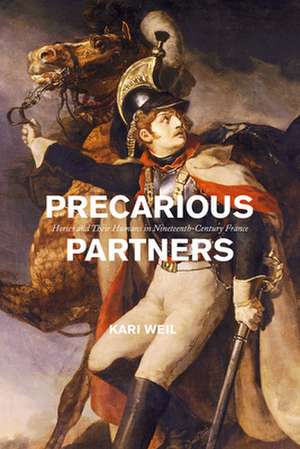Precarious Partners: Horses and Their Humans in Nineteenth-Century France: Animal Lives
Autor Kari Weilen Limba Engleză Hardback – 23 mar 2020
Weil traces the evolving partnerships established between French citizens and their horses through this era. She considers the newly designed “races” of workhorses who carried men from the battlefield to the hippodrome, lugged heavy loads through the boulevards, or paraded women riders, amazones, in the parks or circus halls—as well as those unfortunate horses who found their fate on a dinner plate. Moving between literature, painting, natural philosophy, popular cartoons, sports manuals, and tracts of public hygiene, Precarious Partners traces the changing social, political, and emotional relations with these charismatic creatures who straddled conceptions of pet and livestock in nineteenth-century France.
Din seria Animal Lives
-
 Preț: 185.07 lei
Preț: 185.07 lei -
 Preț: 177.10 lei
Preț: 177.10 lei -
 Preț: 184.22 lei
Preț: 184.22 lei -
 Preț: 152.85 lei
Preț: 152.85 lei -
 Preț: 173.53 lei
Preț: 173.53 lei -
 Preț: 223.80 lei
Preț: 223.80 lei -
 Preț: 262.67 lei
Preț: 262.67 lei -
 Preț: 109.79 lei
Preț: 109.79 lei -
 Preț: 109.79 lei
Preț: 109.79 lei - 22%
 Preț: 481.55 lei
Preț: 481.55 lei
Preț: 466.37 lei
Preț vechi: 597.58 lei
-22% Nou
Puncte Express: 700
Preț estimativ în valută:
89.24€ • 93.41$ • 74.28£
89.24€ • 93.41$ • 74.28£
Carte indisponibilă temporar
Doresc să fiu notificat când acest titlu va fi disponibil:
Se trimite...
Preluare comenzi: 021 569.72.76
Specificații
ISBN-13: 9780226686233
ISBN-10: 022668623X
Pagini: 240
Ilustrații: 4 color plates, 28 halftones
Dimensiuni: 152 x 229 x 20 mm
Greutate: 0.43 kg
Ediția:First Edition
Editura: University of Chicago Press
Colecția University of Chicago Press
Seria Animal Lives
ISBN-10: 022668623X
Pagini: 240
Ilustrații: 4 color plates, 28 halftones
Dimensiuni: 152 x 229 x 20 mm
Greutate: 0.43 kg
Ediția:First Edition
Editura: University of Chicago Press
Colecția University of Chicago Press
Seria Animal Lives
Notă biografică
Kari Weil is University Professor of Letters at Wesleyan University. She is the author of Thinking Animals: Why Animal Studies Now? and Androgyny and the Denial of Difference.
Cuprins
Preface
Introduction: The Most Beautiful Conquest of Man?
1. Heads or Tails? Painting History with a Horse
2. Putting the Horse before Descartes: Sensibility and the War on Pity
3. Making Horsework Visible: Domestication and Labor from Buffon to Bonheur
4. Let Them Eat Horse
5. Purebreds and Amazons: Race, Gender, and Species from the Second Empire to the Third Republic
6. “The Man on Horseback”: From Military Might to Circus Sports
7. Animal Magnetism, Affective Influence, and Moral Dressage
Afterword
Acknowledgments
Notes
Index
Introduction: The Most Beautiful Conquest of Man?
1. Heads or Tails? Painting History with a Horse
2. Putting the Horse before Descartes: Sensibility and the War on Pity
3. Making Horsework Visible: Domestication and Labor from Buffon to Bonheur
4. Let Them Eat Horse
5. Purebreds and Amazons: Race, Gender, and Species from the Second Empire to the Third Republic
6. “The Man on Horseback”: From Military Might to Circus Sports
7. Animal Magnetism, Affective Influence, and Moral Dressage
Afterword
Acknowledgments
Notes
Index
Recenzii
"A rich and sophisticated analysis that uses materials from literary fiction to fine art, ephemera and philosophy.”
“Precarious Partners offers an insightful and illuminating exploration of horse-human relations in nineteenth-century France… Weil’s command of written and visual sources is outstanding throughout the book.”
“Precarious Partners brilliantly ties horse-human relations to questions of race, gender, class, and species in nineteenth-century France. From ‘women on horseback’ to pity for horses to the consumption of horsemeat; and from natural history to art history, philosophy, literature, and politics, Weil’s wide-ranging and interdisciplinary study makes an outstanding contribution to French studies, cultural history, and animal studies.”
“Weil’s gentle prose effortlessly unfolds the most complex overlapping of human and equine histories. Her finely detailed research holds our most alert attention in that she demonstrates how equestrian worlds produce intricate formations of race, gender, sexuality, and species within and beyond their ostensible domain. Precarious Partners is intensely readable and leaves the reader wanting to follow its every thread.”
